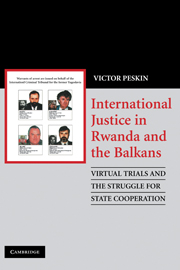 International Justice in Rwanda and the Balkans
International Justice in Rwanda and the Balkans Book contents
- Frontmatter
- Contents
- Maps and Timelines
- Acknowledgments
- Permissions
- Note on Pronunciation
- MAP 1 Map of the Former Yugoslavia
- MAP 2 Map of Rwanda
- PART I INTRODUCTION
- PART II THE BALKANS: STRATEGIES OF NON-COMPLIANCE AND INSTRUMENTS OF PRESSURE
- PART III RWANDA: VIRTUAL TRIALS, INTERNATIONAL JUSTICE, AND THE POLITICS OF SHAME
- 6 The Struggle to Create the International Criminal Tribunal for Rwanda
- 7 “Trials of Cooperation” and the Battles for Karamira and Barayagwiza
- 8 Investigating Rwandan Patriotic Front Atrocities and the Politics of Bearing Witness
- 9 Victor's Justice Revisited: The Prosecutor v. Kagame
- PART IV CONCLUSION
- Bibliography
- Index
8 - Investigating Rwandan Patriotic Front Atrocities and the Politics of Bearing Witness
Published online by Cambridge University Press: 05 September 2012
- Frontmatter
- Contents
- Maps and Timelines
- Acknowledgments
- Permissions
- Note on Pronunciation
- MAP 1 Map of the Former Yugoslavia
- MAP 2 Map of Rwanda
- PART I INTRODUCTION
- PART II THE BALKANS: STRATEGIES OF NON-COMPLIANCE AND INSTRUMENTS OF PRESSURE
- PART III RWANDA: VIRTUAL TRIALS, INTERNATIONAL JUSTICE, AND THE POLITICS OF SHAME
- 6 The Struggle to Create the International Criminal Tribunal for Rwanda
- 7 “Trials of Cooperation” and the Battles for Karamira and Barayagwiza
- 8 Investigating Rwandan Patriotic Front Atrocities and the Politics of Bearing Witness
- 9 Victor's Justice Revisited: The Prosecutor v. Kagame
- PART IV CONCLUSION
- Bibliography
- Index
Summary
Introduction
Despite the mutual pledges of friendship and understanding in the aftermath of the Barayagwiza crisis, the International Criminal Tribunal for Rwanda (ICTR) and the Rwandan government were soon enmeshed in a new confrontation that threatened the tribunal's independence and its hope for uninterrupted state cooperation. The government's determination to block Chief Prosecutor Del Ponte's investigation of Rwandan Patriotic Front (RPF) massacres of Hutu civilians would become the central battleground of state–tribunal conflict.
In the first part of this chapter, I examine the political context in which Del Ponte embarked on her investigations of the RPF in 2000. The idea of prosecuting atrocities committed by all sides of an armed conflict is a foundational principle of the contemporary ad hoc tribunals as well as the International Criminal Court. Yet Del Ponte's decision to probe the RPF's role in atrocities against Hutu civilians was controversial because in the aftermath of the genocide, the Tutsi-led RPF and the Tutsi population in general were widely recognized internationally as victims deserving sympathy, not scrutiny.
In the second part of the chapter, I examine the government's response to the tribunal's early attempts to prod Rwanda to cooperate with these investigations. The centerpiece of the government's response was a “counter-shaming” campaign against the tribunal aimed at undermining its reputation and diverting international attention away from the government's attempts to stop the RPF investigations. The government's counter-shaming offensive had two elements.
- Type
- Chapter
- Information
- International Justice in Rwanda and the BalkansVirtual Trials and the Struggle for State Cooperation, pp. 186 - 206Publisher: Cambridge University PressPrint publication year: 2008


